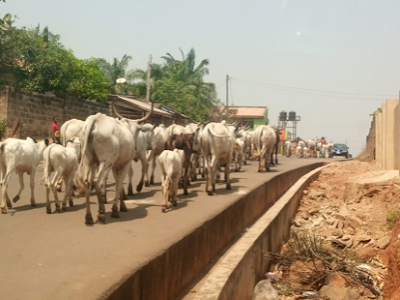The federal ministry of agriculture and rural development
says it has confirmed cases of anthrax in some farm animals in Niger state.
The government, however, did not mention the name of the
affected farm and the extent of the infection.
Anthrax is an infection caused by the spore-forming
bacteria, Bacillus anthracis. It typically affects ruminants such as cows,
sheep, and goats.
It is a zoonotic disease — transmissible from contaminated
animals to humans.
Humans can get infected if they handle or are involved in
the slaughter of a sick animal, or are in contact with contaminated animal
products.
In a statement on Monday signed by Columba Vakuru, chief
veterinary officer of Nigeria, the ministry said there was a notification on
July 14 of animals manifesting symptoms of anthrax in a multi-specie farm in
Suleja, Niger state.
Vakuru said some of the infected animals had symptoms,
including oozing of blood from their body openings — anus, nose, eyes and ears.
“A rapid response
team comprising of federal and states one health professional team visited the
farm to conduct preliminary investigations and collected samples from the sick
animals,” the statement reads.
“Subsequent laboratory tests by the National Veterinary
Research Institute laboratory confirmed the diagnosis, marking the first
recorded case of anthrax in Nigeria in recent years and after the report of an
outbreak of anthrax in Northern Ghana a few weeks ago. All animals affected
have died.”
The ministry said in collaboration with the Niger state
government, it has taken proactive measures to ensure the outbreak is
controlled and contained quickly in Nigeria.
“This include quarantine of the affected farm, deployment of
anthrax spore vaccines to the affected and adjoining farms to vaccinate
in-contact animals, educating the farm workers of the affected farms on
symptoms, preventive measures and what to do when encounter with suspected
case,” the statement reads.
“The federal ministry
of agriculture and rural development hereby encourages all livestock owners to
remain vigilant and promptly report any suspicious illness or deaths in their
animals and to avoid contact with sick or dead animals and their products, to
exercise caution when buying animals — cows, camels, sheep, goats, and other
livestock — from Nigerian states bordering Benin, Chad, and Niger, and from
Ghana and Togo via waterways.”
The ministry also advised against the slaughtering of farm
animals at home, and eating of sick animals.











Add Comment